Louis, you may just have pissed off the wrong guy.
 We’ve spent 20 episodes getting to know Mahmut Tuğrul, and he’s changed a lot over the course of several (on-screen) months – as 17 year-old boys will. He’s seen highs and lows, both personally and for his people – been shamed and effectively exiled and forced to earn his way back into his country’s circle of both power and trust. He’s seen the world and learned to adapt to the ways of foreigners whose customs are different from his own, and learned how to be a leader of men in a way he never could have in military academy or as a politician in the Divan.
We’ve spent 20 episodes getting to know Mahmut Tuğrul, and he’s changed a lot over the course of several (on-screen) months – as 17 year-old boys will. He’s seen highs and lows, both personally and for his people – been shamed and effectively exiled and forced to earn his way back into his country’s circle of both power and trust. He’s seen the world and learned to adapt to the ways of foreigners whose customs are different from his own, and learned how to be a leader of men in a way he never could have in military academy or as a politician in the Divan.
 All the while, though, Mahmut has been consistent in one thing – always, he’s been an advocate for peace. He’s sought to diffuse and defer, to forestall conflict and loss of life and avoid it altogether if possible. He’s taken the fight to the enemy when given no choice, but never sought out battle where other options like diplomacy or subterfuge were viable options. His main goal has been to build a wall high and strong enough that Minister Louis wouldn’t dare to throw himself against it, and to be ready to defend it only if given no choice.
All the while, though, Mahmut has been consistent in one thing – always, he’s been an advocate for peace. He’s sought to diffuse and defer, to forestall conflict and loss of life and avoid it altogether if possible. He’s taken the fight to the enemy when given no choice, but never sought out battle where other options like diplomacy or subterfuge were viable options. His main goal has been to build a wall high and strong enough that Minister Louis wouldn’t dare to throw himself against it, and to be ready to defend it only if given no choice.
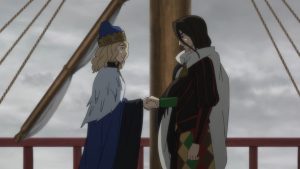 Now, though, we’ve seen a fundamental shift. Mahmut has no options left – his foster father has been killed, he’s seen allies have their villages and towns sacked and burned. The war he sought to avoid is upon him, and he’s dedicating himself fully to fighting it in the most effective way possible. How good can he be at warfare if he turns all of his strategic brilliance towards waging it? We’re in the process of finding out, but the answer is obviously “pretty damn good”. The real question for Mahmut, I think, is how he can maintain the essence of who he is when he’s forced to apply himself fully to a course that’s fundamentally against his nature. The war with the Empire is clearly the story now, but this more personal battle is definitely a part of that story.
Now, though, we’ve seen a fundamental shift. Mahmut has no options left – his foster father has been killed, he’s seen allies have their villages and towns sacked and burned. The war he sought to avoid is upon him, and he’s dedicating himself fully to fighting it in the most effective way possible. How good can he be at warfare if he turns all of his strategic brilliance towards waging it? We’re in the process of finding out, but the answer is obviously “pretty damn good”. The real question for Mahmut, I think, is how he can maintain the essence of who he is when he’s forced to apply himself fully to a course that’s fundamentally against his nature. The war with the Empire is clearly the story now, but this more personal battle is definitely a part of that story.
 As the siege of Cielo continues, the odds seem to turn more and more on Balt-Rhein’s favor – Carbajal’s decision to take in refugees meaning the stores inside the castle walls are quickly running dry. And indeed, things are going badly in Cielo – the Director’s men are turning on him, convinced that Turkiye has failed, Venedik has (again) abandoned an ally and surrender is the only option. But there are downsides to the Empire in this long siege, too – as they sit preoccupied with Cielo, the Eastern part of Rumerania (including most of the city-states of what is effectively Italy) is being united in alliance against them by Venedik.
As the siege of Cielo continues, the odds seem to turn more and more on Balt-Rhein’s favor – Carbajal’s decision to take in refugees meaning the stores inside the castle walls are quickly running dry. And indeed, things are going badly in Cielo – the Director’s men are turning on him, convinced that Turkiye has failed, Venedik has (again) abandoned an ally and surrender is the only option. But there are downsides to the Empire in this long siege, too – as they sit preoccupied with Cielo, the Eastern part of Rumerania (including most of the city-states of what is effectively Italy) is being united in alliance against them by Venedik.
 Mahmut is forced to leave Cielo to his team, and slips away from Cielo (by sea) in order to join the remnants of Halil Pasha’a army and gather them into a viable fighting force. Venedik, meanwhile, has decided to come to Cielo’s aid as Mahmut requested, and indeed won a major sea battle over Imperial allies – but a storm has delayed they and news of their victory from reaching Cielo. Bold action is needed, and that’s what Mahmut takes. He gathers the roughly 17,000 survivors and effectively becomes a raiding party, attacking the Imperial garrison strictly for purposes of stealing (back) their livestock – vital to maintaining the Empire’s huge (and cumbersome) siege force.
Mahmut is forced to leave Cielo to his team, and slips away from Cielo (by sea) in order to join the remnants of Halil Pasha’a army and gather them into a viable fighting force. Venedik, meanwhile, has decided to come to Cielo’s aid as Mahmut requested, and indeed won a major sea battle over Imperial allies – but a storm has delayed they and news of their victory from reaching Cielo. Bold action is needed, and that’s what Mahmut takes. He gathers the roughly 17,000 survivors and effectively becomes a raiding party, attacking the Imperial garrison strictly for purposes of stealing (back) their livestock – vital to maintaining the Empire’s huge (and cumbersome) siege force.
 This is an interesting contrast in military style here – one we’ve seen broadly play out over and over throughout history, on many continents in many eras. The effectively nomadic Turkiye forces are mobile and fast, and have centuries of experience in herding animals. The Balt-Rhein forces are solid and seemingly immovable, well-armed and shielded. It’s Lily Kokoschka’s tactics that have really been vital in tipping the scales in Balt-Rhein’s favor, predicting the enemy’s movements and turning their strengths into weaknesses. But Halil was an old man, and Mahmut a very young one – for him, adaptation and unpredictability come much more naturally. And for once, Lily makes a mistake – though she knows it’s Halil’s blonde foster son who leads the Turkiye army now, she underestimates him.
This is an interesting contrast in military style here – one we’ve seen broadly play out over and over throughout history, on many continents in many eras. The effectively nomadic Turkiye forces are mobile and fast, and have centuries of experience in herding animals. The Balt-Rhein forces are solid and seemingly immovable, well-armed and shielded. It’s Lily Kokoschka’s tactics that have really been vital in tipping the scales in Balt-Rhein’s favor, predicting the enemy’s movements and turning their strengths into weaknesses. But Halil was an old man, and Mahmut a very young one – for him, adaptation and unpredictability come much more naturally. And for once, Lily makes a mistake – though she knows it’s Halil’s blonde foster son who leads the Turkiye army now, she underestimates him.
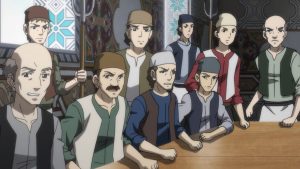 It’s the nature of Mahmut’s position here that unlike when the tables were reversed, a strategic triumph doesn’t mean a rout of the enemy and total victory – it just means choosing the time and place of battle. But we can rest assured that he’s chosen to lure Pino’s army to this place because he feels it gives him the best chance at victory, and the intervening weeks have given Mahmut the chance to exploit one of his own great strengths – gathering allies to his side. With the strength of the local (Spanish and Portuguese?) armies beside his own, Mahmut has evened the odds for this showdown – and now that strategy has brought him the battle he wanted, it’s time for him to show he’s every bit as brilliant when it comes to tactics.
It’s the nature of Mahmut’s position here that unlike when the tables were reversed, a strategic triumph doesn’t mean a rout of the enemy and total victory – it just means choosing the time and place of battle. But we can rest assured that he’s chosen to lure Pino’s army to this place because he feels it gives him the best chance at victory, and the intervening weeks have given Mahmut the chance to exploit one of his own great strengths – gathering allies to his side. With the strength of the local (Spanish and Portuguese?) armies beside his own, Mahmut has evened the odds for this showdown – and now that strategy has brought him the battle he wanted, it’s time for him to show he’s every bit as brilliant when it comes to tactics.


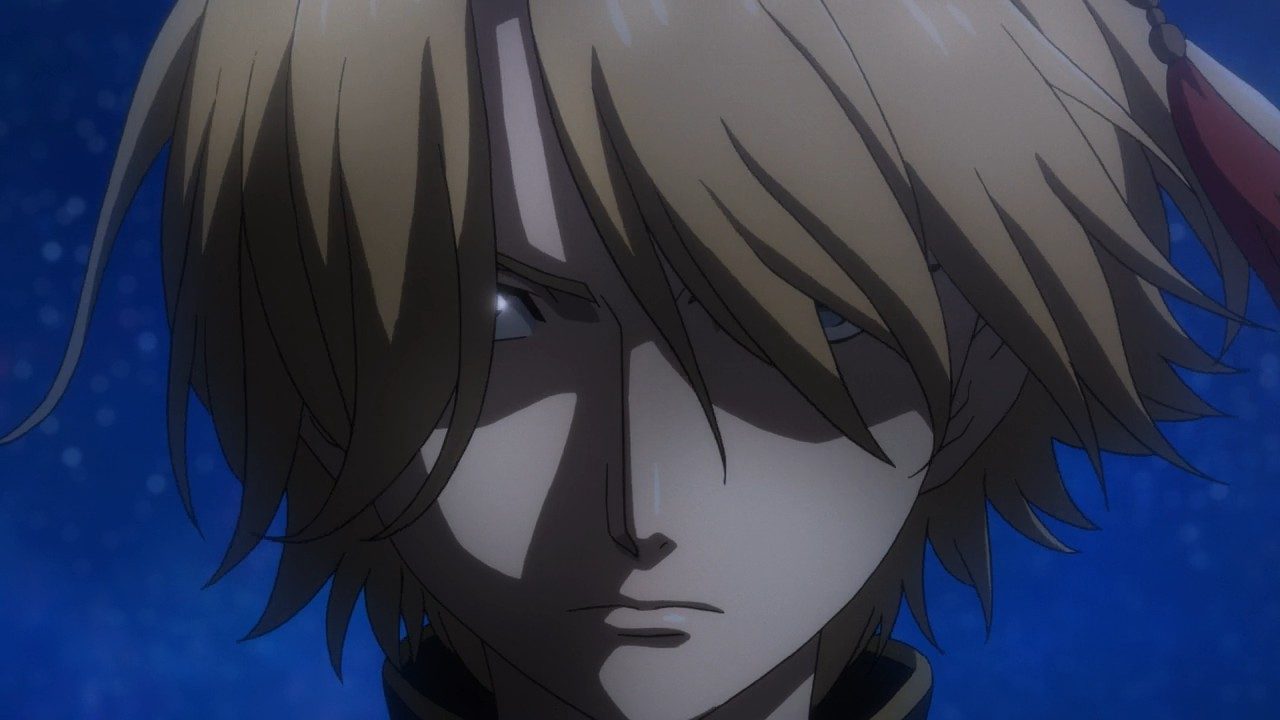
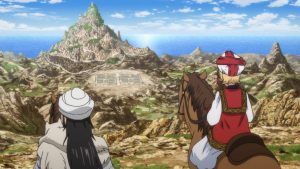




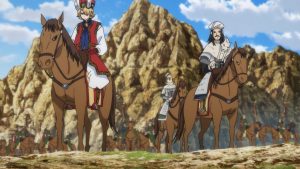

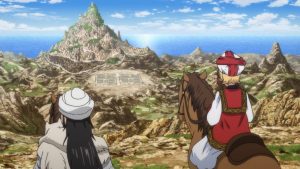
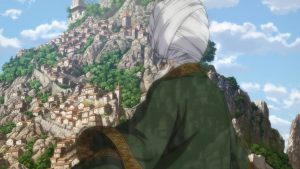



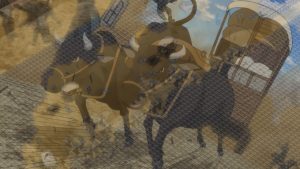
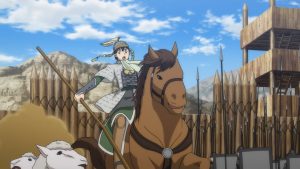
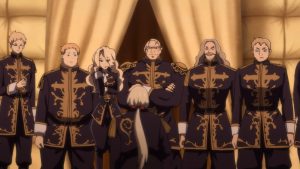





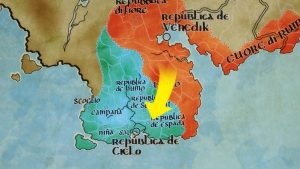




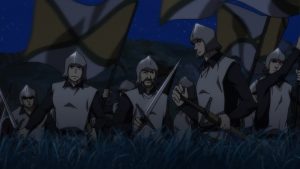
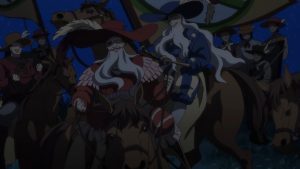
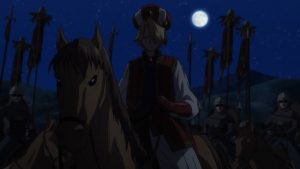




Kurik
December 2, 2017 at 3:31 amMan I love this show…..It will be a very long week waiting to see how this unfolds….I hope they ensure they kill the leaders of Pinos army because while I respect him he and his crew are dangerous.
Guardian Enzo
December 2, 2017 at 8:01 amI’m conflicted. I actually really like Pino – he’s a good general who doesn’t love war. He listens to smart people who work for him.